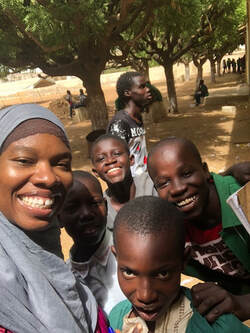 By Sakeena Abdul-Hakeem The kids call me “aunty.” What else are they expected to call a nearly 40 year old American lady who suddenly shows up in their third grade classroom? After living in Senegal, West Africa for two years, looking for educational opportunities for adults, I was dissatisfied with the options. My understanding of Wolof was too rudimentary to attend lectures by the resident scholars. And my Arabic knowledge had too many holes in its foundation to be useful. I was attending a one hour Arabic class, four days a week, but the main focus was on memorizing poetry. I struggled through basic Arabic conversation, but could parrot lines of ancient prose. I was no closer to my goal of understanding the language of the Quran than when I’d first arrived in Africa. That’s when the director of a local private school invited me to attend the El Hajj Abdullahi Niass Institute. I’d thought for sure that the local K-12 schools were for children up to age 18, just as they are in the a United States. Boy was I wrong. Have you ever thought about going back to school? What did that look like for you? Perhaps you can enroll in night classes or weekend courses at your local college. Maybe you’re looking to achieve a financial goal that earning another degree or a certificate will ensure. Not for me. I was going all the way back. Back to primary school. After an initial assessment, which I didn’t realize I was taking until half way through, I was placed in 3rd grade. I thought I was just having a polite conversation with the principal. In Arabic, he asked me my name and where I was from. He asked if I could recite a Hadith, a surah from the Quran, and if I knew the difference between verbs and nouns. He scribbled a quick note and directed my young translator to show me the 3rd grade classroom. I thought perhaps I’d peek in, greet the teacher and make arrangements to start attending class the following week. Nope! The teacher rearranged the rows of girls and squeezed me onto a narrow bench besides two of them. This was to be my first day of class. As I sat in the classroom, I noticed some major differences between our American educational system and theirs. Instead of colorful posters pasted to the walls, they were bare. All attention was focused on the huge blackboard in the front of the room. There were about 80 students to one teacher. And some of these kids didn’t look like 8 year olds- what I would consider to be a 3rd grader. In fact, a man sitting two rows over from me had a speckled beard! What could I learn in 3rd grade in Africa? I really had to humble my nearly 40 year old ego to learn from Muhammad, which I would discover was the name of almost every teacher in the entire school. We baked in the hot classrooms without so much as a fan, but no one complained. The students stood at silent attention whenever the teacher, or a visiting guest, would enter the classroom. If the teacher was in class before them, the students stood at the door of the classroom waiting for permission to enter. They ooh’d and aah’d in appreciation whenever a fellow classmates was called upon to recite a lesson from the Quran. They stood to respond whenever the teacher called on them. The girls took turns sweeping the classroom each morning while the boys cleaned the blackboard and arranged the desks properly. There was a lot more to learn here than just reading and writing. There was a wholistic approach to education. It was more so about respect, good manners, honoring knowledge and it’s teacher- developing a whole person as opposed to just the mind- which seems to be the problem with much of western education. Many of the students had completed the memorization of the entire Holy Quran before enrolling in Arabic school, hence the varied ages of the students. Although, initially it took some getting used to, I really benefited from Arabic school in Senegal. I have a greater appreciation for traditional knowledge and it’s transmission. I believe every person who has the will, should take the opportunity to enjoy learning traditional Islamic knowledge in Africa. The holes in my Arabic foundational knowledge have been filled and I can see great strides in my understanding of Quran. If this is your goal, you too can achieve it, no matter what age. It just takes going back to the basics. All the way back. Sakeena Abdul-HakeemSakeena Abdul-Hakeem is an entrepreneur, sign language interpreter, mother, and published author. For more of her work, check out her blog SakeenainSenegal.wordpress.com and find her novels and short stories on Wattpad.
3 Comments
Your Kareema
4/1/2020 04:35:38 pm
How fascinating! Learning quranic Arabic should be the goal of every lifelong student. Knowledge of the Arabic language not only helps in understanding our daily prayers, duahs, and sayings but also gives us access to scholarly texts and interpretations if Quran and Sunnah that aren't yet published in English- and there are many.
Reply
4/1/2020 06:28:33 pm
السلام عليكم
Reply
Fatima Khokhar
4/2/2020 09:46:35 pm
Fascinating! What a humbling reminder in seeking knowledge at any and all ages and stages.
Reply
Leave a Reply. |
Don't miss another edition of A Message from Makkah. Click the button below to join our mailing list
Contact Us for Advertising Opportunities!
Archives
January 2023
Categories
All
Our Sponsors |
Makkah International Institute
 RSS Feed
RSS Feed